
Let’s face it — you’re probably overpaying for flights. Whether it’s poor timing or lack of know-how, you may be frustrated in the search for affordable fares. Many travelers struggle to keep costs low without sacrificing their preferred travel destinations, and you may have even heard friends or family say, “Who plans flights for next year in October 2024??”
I’ve never heard of anyone regret planning their travel schedule too early. While you may not want to book a flight as early as 4-6 months out, the truth is that searching for and planning flights early can only be helpful. Not only could you potentially cut costs, but you may also squeeze in an additional trip each year, even with a limited budget.
Late planning can limit your options, especially for peak seasons and international flights — two months before departure might already be too late to secure the cheapest tickets.
In this short guide, I’ll walk you through reliable methods to find cheap flights, before further exploring ideas to streamline your travel planning based on known travel dates and budgets.
Step 1: Using Google Flights to Find Cheap Flights

Google Flights is one of the most powerful flight planning tools we have. By mastering a few techniques, you can dramatically cut costs.
Whether you have fixed destinations or are flexible with both dates and locations, here’s how you can make the most of it.
1) Fixed Destination, Flexible Dates
If you know where you want to go but are open to when, here’s a simple but effective approach:
- Search Your Destination: Enter your departure and arrival cities on Google Flights.

- Date Scrolling for Lowest Prices: Click on the departure date, and you’ll see price options appear. You can scroll and see prices way out into future months. Look for the green dollar amounts, which indicate the cheapest fares. Do the same when you click on the return date.
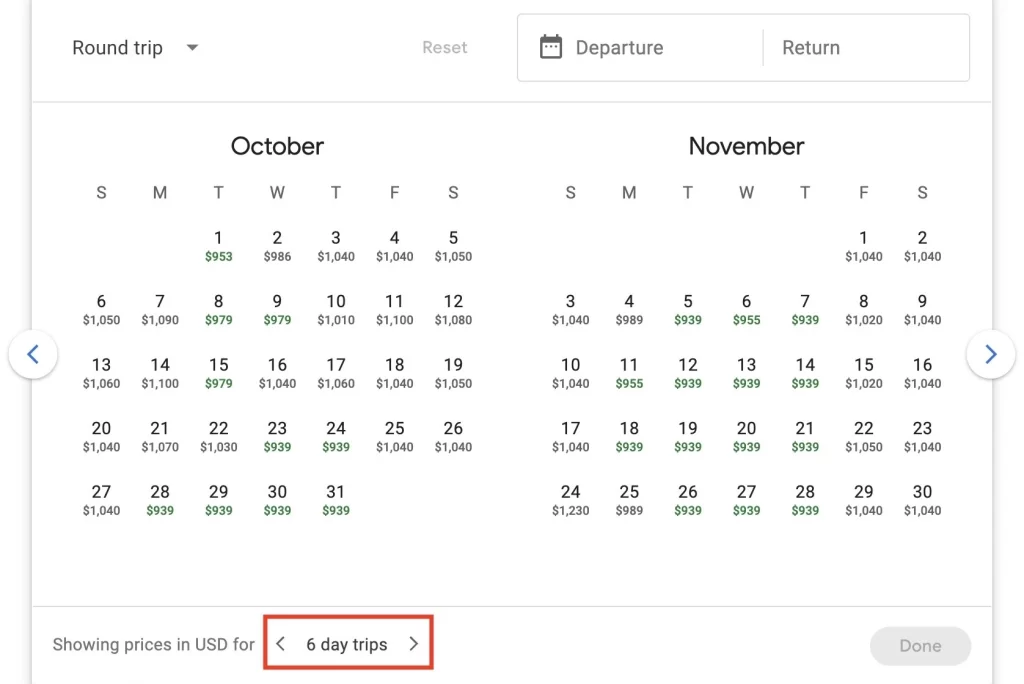
- Adjust Trip Duration: The default is 7 days, but you can tweak this to find cheaper options for longer stays. Trips lasting 7 days or more are often cheaper than shorter ones.
- Set Filters: Next, you may want to play around with a few filters. For instance, filter out flights with layovers if you’re aiming for direct routes.

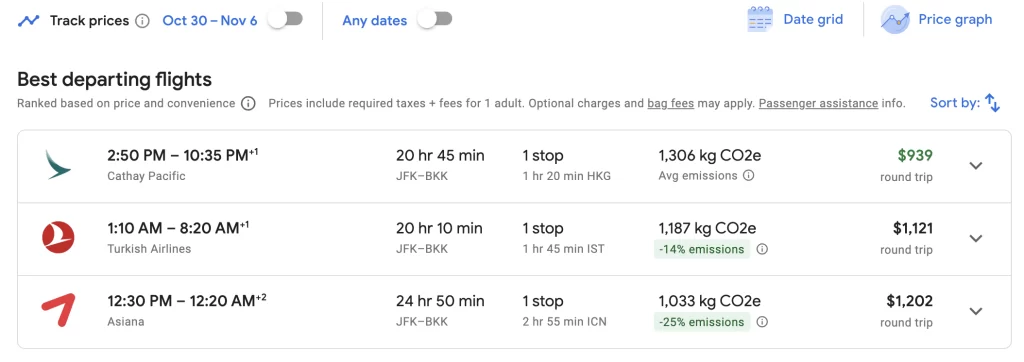
- Booking Tip: Once you’ve found the right flight, it’s usually best to book directly through the airline’s website to avoid complications that can arise from third-party booking sites. With knowledge of the airline and the desired flights, you can now head to the airline website to book the flight.
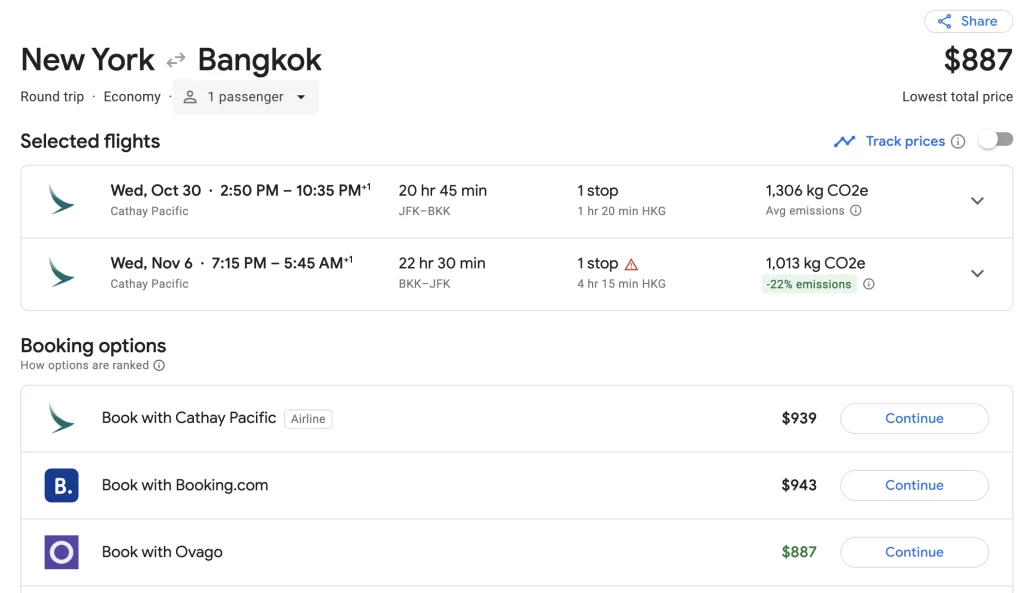
2) Flexible Destination, Flexible Dates
If you’re feeling adventurous or simply want the best deals without being set on a location:
- Open up Google Flights, select your departure city, scroll down, and click on the map area.
- Zoom in on Regions on the Google Flight Map: View a map of possible destinations by zooming in and out to explore the cheapest flights, whether you’re eyeing Southeast Asia or Europe.
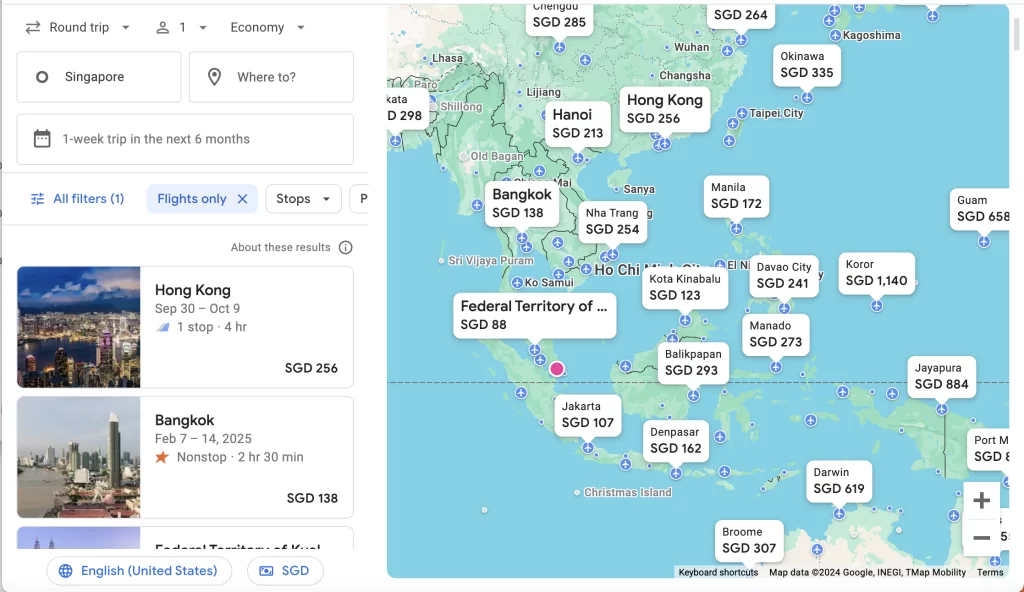
- Select either specific dates or flexible dates. For flexible dates, you can select your desired travel month (if any) and set the trip duration (weekend, 1-week, or 2-week trip).
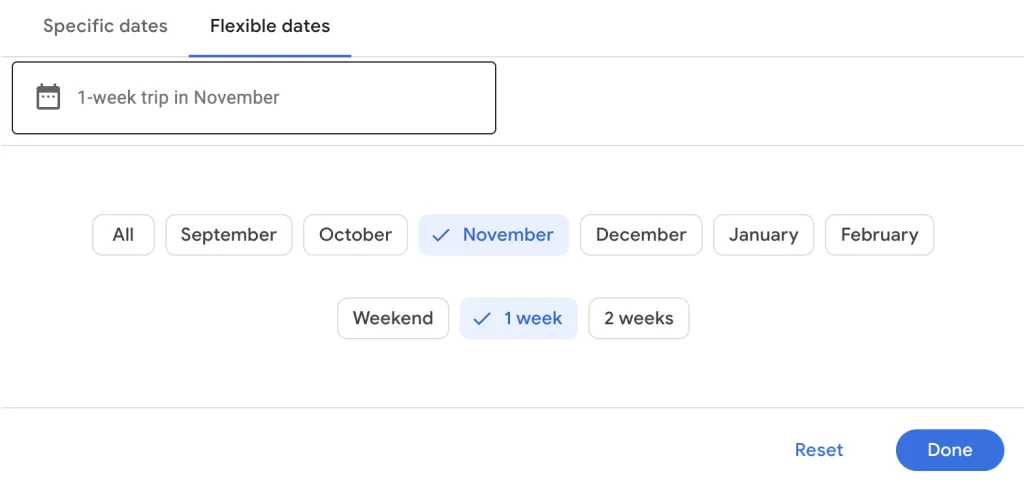
- Filter and Discover: The map will show the cheapest destinations for your preferred time period. Play around with different filters. You might find a hidden gem or a surprise vacation option.
This article was originally published on unboundist.com. If it is now published on any other site, it was done without permission from the copyright owner.
Step 2: Strategic Flight Planning, Beyond The Tactics

Even with these tools, narrowing down your options and deciding when to book can be overwhelming – you may still be at a loss given the abundance of potential dates and flights.
I found myself stuck between choosing flights with only slight price differences while also being unsure about my preferred travel dates — an incredibly inefficient and frustrating process that I wouldn’t want you to experience.
The following strategies can help make your flight planning more efficient, saving you both time and money.
1) Know Your Destinations in Advance
If you’re a frequent traveler or portable professional with upcoming business trips or personal “residency research” (scouting potential cities to live in), knowing your destinations ahead of time is key.
When you are sure about the cities you are visiting, you can plan well in advance and monitor flight prices accordingly.
2) Keep an Organized Schedule

This article isn’t about annual or monthly planning, but here’s the gist: Take a look at your annual calendar. Mark down any dates when you absolutely can’t travel, whether due to work commitments or personal obligations. Then identify the best travel periods for traveling.
- Elimination based on your job or business hectic periods: If you’re a working adult who’s not new to your workplace, you should have an idea of your busy periods. You can look back on your previous year as a reference. This can help you eliminate several months or weeks within a quarter.
- Spreadsheet Tracking of Flight Prices in Desired Windows:
- Create a spreadsheet listing your travel windows and blackout dates.
- When you search for flights, only focus on flights within your desired travel windows – note down the best flights and their costs. This way, you significantly narrow your search.
3) Mobilize a Strategic Travel Budget

Most people don’t know how to budget their trips, resulting in constant overspending. This can put a strain on personal finances or even limit future trips.
Instead of suboptimal planning, here’s how you can strategically plan your travel expenses:
- Tracking: Use an annual travel finances tracking sheet.
- Per trip tracking: Whenever you travel, track how much you spent on the essential travel logistics – i.e. flights, accommodation, data, and insurance – and on-the-ground expenses like food, local transport, and entertainment.
- Total annual expenses: Total up expenses for all trips and derive your total travel expenses in a given year
- Plan your upcoming travel budget:
- Total budget: Decide if you want to increase, maintain, or limit your annual travel budget.
- Review and optimization: Did you overspend on any particular category like flights or accommodation in the past year? You may want to set limits or focus on driving down prices.
Once you’ve established a travel budget for the year, allocate a portion for flights and keep track of your spending after each trip.
If you’re under budget, this could mean you’ve booked strategically enough to squeeze in an extra trip or upgrade to a more convenient flight.
If you’re over budget, adjust your flight search criteria to target cheaper dates, times, or destinations to balance the budget.
Narrowing Down Your Destinations and Travel Dates

With this knowledge, you should be able to narrow your destinations and preferred travel weeks. This makes it much easier to plan.
Example:
Let’s say you plan to visit Manila in the first half of 2025. You’ve blocked out five possible travel weeks in your spreadsheet, but two of these weeks are especially ideal due to personal circumstances, holidays, or job considerations. After using Google Flights, you discover that one of those weeks happens to have significantly cheaper flights. With your organized approach, you’re able to book the best deal – you’ve successfully optimized your travel schedule while driving down expenses.
Conclusion: The Benefits of Advanced Planning
While booking last minute may work for some, advanced planning saves you time, money, and unnecessary hassle.
Even if you’re not ready to book yet, it’s still valuable to track your desired flights and prices. Remember, you don’t have to lock in your plans today – just start noting down flight options and prices.
Keep an eye on deals, and when the time is right, you’ll be prepared to book — without compromising on your schedule or preferred destinations.